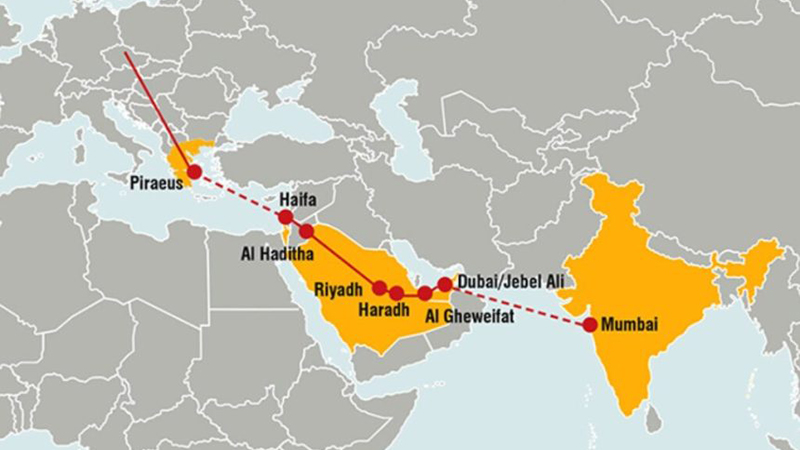One of the biggest casualties of the Israel-Gaza conflict is likely to be the ambitious India-Middle East-Europe Economic Corridor (IMEC). The project was announced on the sidelines of the G20 Summit held last month in Delhi and aims to connect India to Europe via the Middle East with ports, railways and roads. Many analysts point out that the IMEC will challenge China’s Belt and Road Initiative when completed, and that is also the reason why the United States has backed the project with great enthusiasm (but has not committed any funding for the project yet).
The proposed corridor will link India to Europe via the UAE, Saudi Arabia, Jordan, Israel and Greece. The Israel-Gaza conflict has of course changed equations between the Middle East and Israel. The 2020 Abraham Accords, wherein the UAE normalised relations with Israel, followed by Bahrain and Morocco, was seen as a watershed moment in Middle East politics.
A little over three years after the Abraham Accords came into force, trade between Israel and the UAE surpassed $2.5bn in 2022 and reached $1.85bn in the first seven months of 2023, according to Reuters news agency. It also saw Saudi Arabia moving forward to recognising Israel, prodded by the US that it would provide the Saudis security assurances. All that changed on October 7 with the horrific attack by Hamas. And as Israel bombs Gaza in an unrelenting fashion, all deals seem off the table. And IMEC is probably one of them.
Economics and politics are deeply intertwined and nowhere is this more obvious than in the ambitious IMEC project to link continents. As the political situation changes and Gaza is pushed into a humanitarian crisis, it will become difficult for the UAE, Saudi Arabia and Jordan to promote any economic activity that links them to Israel. It is also to be noted here that this becomes more problematic in Jordan where most of the kingdom’s population is ethnically Palestinian, including Queen Rania.
With the conflict showing little signs of an early ceasefire and Israel getting ready for a ground invasion of Gaza, we might be looking at a long conflict. Iran is also a party to the conflict through its militia like Hamas and Hezbollah in Lebanon. For Iran, this is also an opportunity to become a major player in Middle East geopolitics. The Saudis, meanwhile, can ill afford an impression both domestically and in the region that they have failed to stand with the Palestinians. And with the Saudis not wanting to go ahead with recognising Israel, IMEC will have trouble taking off. It would be a safe bet to state at this point that even if the project eventually does take shape, it is unlikely to happen as long as this conflict and humanitarian crisis continues.
US President Joe Biden has twice since the October 7 attacks, said that he is convinced that IMEC is one of the reasons why Hamas attacked Israel. “I’m convinced one of the reasons Hamas attacked when they did, and I have no proof of this, just my instinct tells me, is because of the progress we were making towards regional integration for Israel, and regional integration overall. We can’t leave that work behind,” he said.
His point is well taken since regional integration of Israel would have left the Palestine cause out in the cold. And there is little doubt in most people’s minds today that the attacks by Hamas were meant to bring the world’s attention back to the Palestine cause, to stop Saudi Arabia from going forward with recognising Israel and yes, this regional economic integration which would have brought Israel closer to UAE and Saudi Arabia.
It is also being pointed out by some analysts that for the short term one can expect to see UAE and Saudi Arabia focus more on their inter-connectivity projects. India can always be included in those equations but the inclusion of Israel is difficult. This also brings to mind the viability of the I2U2 forum going forward. I2U2 includes India, Israel, the UAE and the US. The conflict will also likely cast a shadow on this forum that has much potential for synergy between these countries. For now, the Gaza crisis following Hamas’s surprise attack and the massive Israeli response will put IMEC and related projects on the backburner. – The writer is a senior journalist based in New Delhi.


Leave a Reply